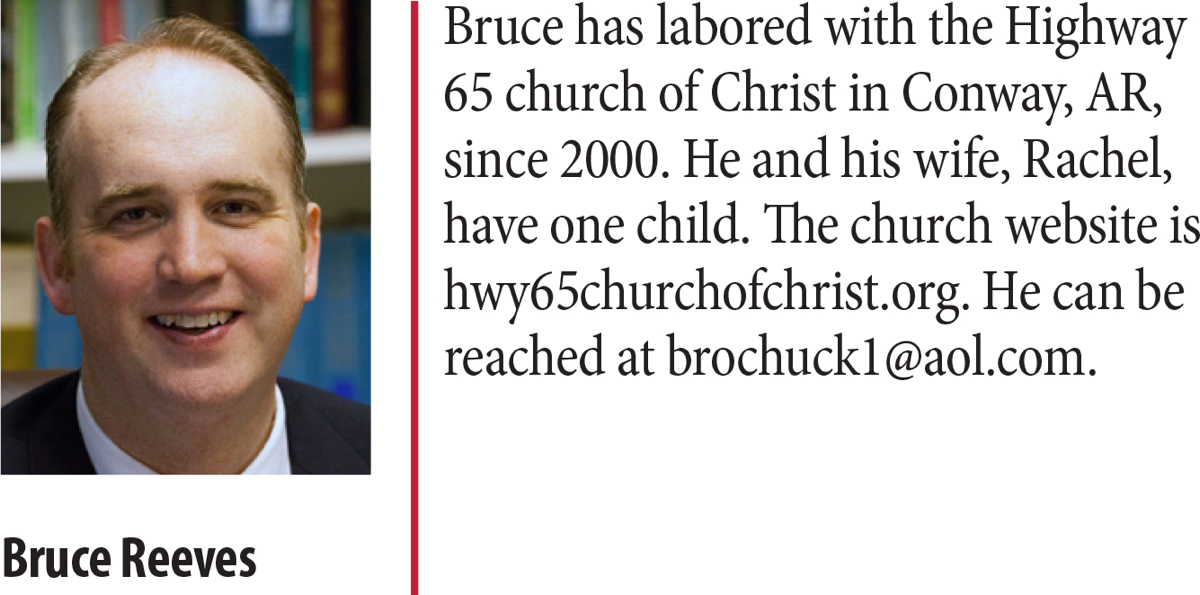By Bruce Reeves
Synopsis: As we battle the doctrine of “the impossibility of apostasy,” we must also correct the error of “the impossibility of assurance” that plagues so many conscientious believers, who are “trying hard, but never sure.”
If you were asked, “Are you saved?,” what would your answer be? There are extremes on both sides of the question. Some take the position that, if they are saved, they can never be lost. Yet, the Scriptures issue clear warnings to believers of the possibility of falling away from the Lord by rebelling against His will (1 Cor. 10:1-13; Gal. 5:3; Heb. 3-4; 10:26-31; 2 Pet. 2:20-22). The Lord’s warnings and promises are beautifully harmonized in God’s word. We must accept both as disciples of Christ. While our assurance is conditioned on faithful devotion to God’s will, Christ’s sacrifice provides us with confidence and peace in the Lord (Rom. 5:1-2; Eph. 2:8-10).
As we battle the doctrine of “the impossibility of apostasy,” we must also correct the error of “the impossibility of assurance” that plagues so many conscientious believers, who are “trying hard, but never sure.” This plagues disciples with doubt, worry, and despair. We should not think that the only way for us to be saved is to die in a worship service or with a prayer falling off our lips. Although we must be cautious of overconfidence (1 Cor. 10:12), it is unbiblical to say that having a healthy confidence in one’s salvation equals arrogance. The message of the cross offers us assurance as we “continue in the faith firmly established and steadfast, and not moved away from the hope of the gospel. . .” (Col. 1:23). The apostle John wrote:
The testimony is this, that God has given us eternal life, and this life is in His Son. He who has the Son has the life; he who does not have the Son of God does not have the life. These things I have written to you who believe in the name of the Son of God, so that you may know you have eternal life (1 John 5:11-13).
Misunderstandings about the character of God lead some to question their salvation. Those who have had overbearing or abusive parents, who currently battle insecurities, or wrestle with the shame of past sins of which they have repented, often struggle with their concept of the love and grace of God. Yet, Jesus is described as the “good shepherd” who “lays down His life for the sheep” (John 10:11). Christ declares, “I came that they may have life, and have it abundantly” (John 10:10). We read in John’s gospel that God “so loved the world that He gave His only begotten Son” so that those who believe will enjoy eternal life (John 3:16). No matter what tribulations we experience, we can know that “in all these things we overwhelmingly conquer through Him who loved us” (Rom. 8:35-39). Christ’s incarnation and sacrifice at Calvary perfectly demonstrate the love God has for all those who would obey Him (John 1:14-18; 14:9; 1 John 4:7-12). We can have confidence in our eternal condition as we walk by faith:
We have come to know and have believed the love which God has for us. God is love, and the one who abides in love abides in God, and God abides in him. By this, love is perfected with us, so that we may have confidence in the day of judgment; because as He is, so also are we in the world. There is no fear in love; but perfect love casts out fear because fear involves punishment, and the one who fears is not perfected in love (1 John 4:16-18).
Do we see God as a loving, heavenly Father? Confessing His steadfast mercy and eternal love does not deny His call of holiness but rather embraces it. Only those who abuse the Lord’s grace attempt to use it as a license to sin (Rom. 6:1-2; Jude 3-4). Those who stand firm in the “true grace of God” will experience the transformation of new life and participate in His divine nature (Rom. 6:3-4; 2 Cor. 3:18; 2 Pet. 1:4) For those who hear the Good Shepherd’s voice and follow Him, there is no external power or influence that can snatch them out of His hand (John 10:26-30). God has a perfect understanding of our background, challenges, potential, and difficulties as His children (Ps. 103:13; 139:1-24; Heb. 4:13).
Our God desires for us to be saved and has given His precious Son to bring us into His presence. He is not out to get us in a “gotcha moment,” but in His longsuffering, He earnestly desires our salvation (1 Tim. 2:3-4; 2 Pet. 3:9). We are not forced to serve Him against our will but are persuasively drawn to His fellowship through the gospel (2 Thess. 2:13-14). The Holy Spirit has revealed His eternal purpose for our glorification in His Son (Eph. 1:1-11; 3:10-11; Phil. 1:6). We can rejoice that the mercies of YHWH’s faithful love never cease toward His followers (Lam. 3:19-26).
It is amazing to consider the great sacrifice of Christ for our sins. God demonstrated His faithfulness, righteousness, and love in giving His Son as the perfect offering of Himself for the sins of the entire world (Rom. 3:23-26; 5:6-8; Eph. 2:4-7). The term for “propitiation” is related to the concept of the “mercy-seat” in Hebrews 9:5, which is descriptive of the lovingkindness and compassion of God toward His people. The nature of the gift of the Lord’s grace tells us how much He loves us (2 Cor. 8:9). Most remarkably, it is a person—the Son of God, rather than an animal or object that is the manifestation and means of God’s great mercy (Rom. 3:23-26; Heb. 9:13-14; 10:1-10). Jesus brings us liberation, release, and freedom (Rom. 6-8). He redeems us from the sins that we have committed (Rom. 3:23) and sin’s reign and power in our lives (Rom. 6:1-17; 8:1-2, 5-8; 12:1-2).
The high priesthood of Christ likewise enables us to come into God’s presence with boldness and confidence. The writer of Hebrews declares that we have a “great high priest who has passed through the heavens, Jesus the Son of God. . . for we do not have a high priest who cannot sympathize with our weaknesses, but One who has been tempted in all things as we are, yet without sin” (Heb. 4:15). As a result of Christ’s reign as our high priest, we are to “draw near with confidence to the throne of grace, so that we may receive mercy and find grace to help in time of need” (Heb. 4:16; 10:12-14).
Our confidence, assurance, and boldness are not grounded in self, but in our sympathetic and compassionate high priest (Heb. 3:6; 4:16; 10:22). Christ is not some cold, uncaring tyrant, but a tender-hearted brother, Savior, and Redeemer. No matter how we are treated by a hostile and wicked world, we must never forget that Jesus, as our merciful mediator, intercedes for us (Rom. 8:34; 1 Tim. 2:5). He is “able also to save forever those who draw near to God through Him, since He always lives to make intercession for them” (Heb. 7:25). We should all consider the supreme sacrifice that Jesus made for us in leaving heaven, making Himself of no reputation, taking the form of a servant, and experiencing the distressing circumstances of suffering humanity, even to the point of death (Phil. 2:6-8). What unfathomable lengths has our God spanned that we might be saved!
The basis of our salvation is God’s love (Rom. 5:6-8); the means is the sacrifice of Christ (1 John 2:1-2), and the conditions are revealed in the gospel (Rom. 1:16-17). We experience the regeneration of our souls when we express faith in Jesus Christ, turn away from our sins in godly sorrow (2 Cor. 7:8-11; Thess. 1:8-10), confess our trust in Jesus as the Son of God (Rom. 10:9-10), and surrender to Christ in water baptism for the forgiveness of our sins (Acts 2:38; 10:47-48; 22:16; 1 Pet. 3:21). We are “justified as a gift by His grace through the redemption that is in Christ Jesus,” and renewed by the working of God, when we are buried with Christ in baptism (Rom. 3:24; 6:3-4; Col. 2:11-13).
Obviously, we will not be saved through sinless performance or meritorious works, because we have all sinned and have no room to boast (Rom. 4:1-2; Titus 3:3-5). When Paul contrasts faith and works in this context, he is referring to a contrast in systems of justification, i.e., the Law of Moses versus the law of Christ: “Where then is boasting? By what kind of law? Of works? No, but by a law of faith. . . Now to the one who works, his wage is not credited as a favor, but what is due. But to the one who does not work, but believes in Him who justifies the ungodly, his faith is credited as righteousness” (Rom. 3:17; 4:4-5). While we “obey unto righteousness” (Rom. 6:16-17), we are saved by Jesus’s death, resurrection, and forgiveness, not our sinlessness. The apostle again describes the blessing of forgiveness on those who obey the gospel and walk in the steps of our spiritual father Abraham, “Just as David also speaks of the blessing on the man to whom God credits righteousness apart from works: ‘Blessed are those whose lawless deeds have been forgiven. . .’ blessed is the man whose sin the Lord will not take into account” (Rom. 4:7-9, 12).
We do not receive a ritualistic, external, or ceremonial cleansing when we, by faith, are baptized into the Lord. Rather, our conscience is truly cleansed by the blood of Christ, purified by the power of the Savior’s offering (Heb. 9:13-14, 23-24; 10:22; 1 Pet. 3:21). We serve a willing Savior who gave Himself for the entire world (1 John 2:2). We are to “draw near with a sincere heart in full assurance of faith, having our hearts sprinkled clean from an evil conscience and our bodies washed with pure water” (Heb. 10:22). God’s faithfulness leads us to an unwavering confession of hope and devoted endurance in doing the will of God (Heb. 10:23, 36). We do not have to be enslaved to fear, because the Lord has promised He will never forsake us (Rom. 8:15; Heb. 13:5-6). We can have assurance because God will always be true to His promises. Let us remember that “Jesus Christ is the same yesterday and today and forever” (Heb. 13:8).
Our assurance in Christ is conditioned on orienting and directing our lives in accordance with the will of God (Heb. 3:14). Children of God have been given the promise of eternal life (1 John 2:25). Although we have not yet received our heavenly reward (2 Tim. 4:6-8), we walk in the living hope of an imperishable inheritance (1 Pet. 1:3-9). Paul encourages suffering Christians to hold on faithfully to their hope in Christ:
For in hope we have been saved, but what is seen is not hope; for who hopes for what he already sees? But if we hope for what we do not see, with perseverance we wait eagerly for it (Rom. 8:23-25).
Considering the many passages that offer us assurance of salvation, it is faithless and faulty exegesis to argue that it is impossible to know if we are saved. Paul’s sacrifice was not in dying, but in living: “For to me to live is Christ and to die is gain. But if I am to live on in the flesh, this will mean fruitful labor for me; and I do not know which to choose. But I am hard pressed from both directions, having the desire to depart and be with Christ, for that is very much better. . .” (Phil. 1:21-23). Earlier in the same text the apostle says that he lived his life according to his “earnest expectation and hope” that he would not be “put to shame in anything, but that with all boldness” Christ would be exalted in his body whether “by life or by death” (Phil. 1:20). Warnings are accompanied by assurances from the Lord throughout Scripture:
Therefore, brethren, be all the more diligent to make certain about His calling and choosing you, for as long as you practice these things, you will never stumble; for in this way the entrance into the eternal kingdom of our Lord and Savior Jesus Christ will be abundantly supplied to you (2 Pet. 1:10-11).
There are those who feel they are saved who are yet teaching erroneous and unbiblical concepts (Jer. 10:23; Isa. 55:8-9; Acts 23:1; Rom. 10:1-3). There are others who have hypersensitive consciences who may not feel they are right with God, but who are actually pleasing unto Him. This is why it is so important for us to grow in our confidence through fuller knowledge and deeper trust (2 Pet. 3:18; 1 John 3:19-22).
While the result of our salvation involves joy, peace, and tranquility in our souls (Phil. 4:4-8), our emotions are not the foundation of our assurance (Rom. 10:17; cf. 5:1-2). The Bible does not teach that the confirmation of salvation is a mystical experience of grace which somehow promises feelings divinely induced by the direct operation of the Holy Spirit. God does not promise visions, miraculous messages, or better-felt-than-told experiences. However, the Holy Spirit’s word in Scripture is “spirit and life” that offers us comfort and encouragement in every trial and tribulation that comes our way (John 6:63; cf. Heb. 4:12). The Spirit bears witness (through the revelation of the gospel) with our human spirit that we are children of God when we understand that we have obeyed the gospel of Christ as revealed by the word of God (Ps. 19; 1 Cor. 2:16; Eph. 3:3-5).
A lack of biblical teaching concerning our assurance in Christ can create a vacuum that draws people away from the truth and may jeopardize them to the influence of various false teachings concerning God’s grace, the Christian’s assurance of salvation, and the nature of sin. Some have fallen into the abyss of Neo-Calvinism and seem to have made it their mission to bring about unbiblical changes in the thinking of faithful brethren.
These changes range from. . .
Automatic forgiveness/continuous cleansing of sins,
Imputation of the perfect righteous life of Jesus to the believer,
Human inability to resist sin and/or understand the Scriptures without a direct enlightenment of the Spirit,
Mystical indwelling of the Holy Spirit, and
Neo-charismatic tendencies toward emotionalism.
Sin is not vaguely defined in the Scriptures, rather it is identified as “unrighteousness” (1 John 5:17), transgression of God’s law (1 John 3:4), and “missing the mark” which “falls short of the glory of God” (Rom. 3:23). The Bible reveals what sin is and encourages us to resist temptation (Rom. 7:13). We are assured that God will not allow us to be tempted beyond our ability but will with each temptation provide a way of escape (1 Cor. 10:13). The Lord would not ask us to do something beyond our ability, yet the apostle John writes: “My little children, I write these things to you so that you may not sin” (1 John 2:1). Thankfully, when we do sin as Christians, we have full confidence that, when we confess our sins, the Lord is faithful and just to forgive us and to cleanse us from all unrighteousness (1 John 1:7, 9; 2:2). The concept that sin is unavoidable is nowhere found in the teachings of Christ or the apostles. When people are made to feel guilty of sin, no matter what they do, it is no wonder that they are vulnerable to false ideas. The idea that a brother or sister cannot drive across town and come home without sinning is not the picture that is painted by the Holy Spirit for the devoted child of God (Rom. 8:5-8; 1 Thess. 5:21). Do we all sin from time to time? Yes! Can we know what sin is by reading God’s word? Absolutely! When we do sin, is the Lord longsuffering as we repent, confess, and pray? Indeed!
While we are to live in the assurance of our salvation, we do so with caution and humility. Our self-appraisal can be faulty if we allow ourselves to be deceived by sin (Jas. 1:14-16). God is the ultimate judge, to be sure, but we can honestly and openly receive His instructions to enjoy the mercy and power of His grace (1 Cor. 4:1-5; 9:24-27). Our Father takes into consideration those issues that are fundamental to our walk with Him, regardless of our stage of growth, e.g., sexual immorality or hatred is a sin for any Christian. However, there are some issues that are relative to our stage of maturity. It is not a sin for the new convert to be on the milk of the word—that is to be expected. Nevertheless, it would be a sin for someone who has been a Christian for a long time to remain in an infantile state rather than to feast on “solid food” with their “senses trained to discern good and evil” (Heb. 5:12-14).
All unrevealed matters belong to God, who will resolve them correctly based on His infinite love, justice, word, and wisdom (Deut. 29:29; John 12:47-48). May we cleave to the conditions God has revealed for us to enjoy His saving grace. May we avoid discussions of hypothetical, emotional, and extreme situations to justify unbiblical theories. Assurance of salvation depends on the Lord and His word, not the thoughts and teachings of fallible men. Let us walk in the Lord’s assurance and promises by loving Him with all our hearts, rather than constructing doctrines to evade the revelation of truth. We are teachers, not the Divine Judge (1 Cor. 4:5). We can neither act as the final judge in unrevealed matters nor extend assurances beyond what the Lord has revealed.




